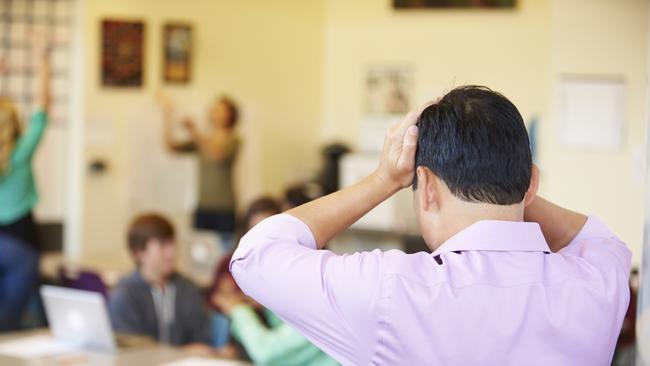Classroom chaos linked to Australian teaching styles
Sexual assaults by students, punch-ups in the playground and drug deals in the toilets are bringing teachers to ‘breaking point’. Is a ‘behaviour curriculum’ the solution?

Teachers should instruct rowdy students in good behaviour and use back-to-basic teaching methods, a senate inquiry into chaotic classrooms will recommend on Wednesday.
Schools need closer ties with health services to give students faster access to psychologists, social workers and behaviour specialists, the Senate Standing Committee on Education has concluded after a 15-month inquiry into the issue of increasing disruption in classrooms.
The committee will recommend that the Senate begin a follow-up inquiry, to investigate Australia’s declining academic standards, focusing on literacy and numeracy.
Its final report contains fresh data from student surveys in the latest global testing of 15-year-old students in maths and science, the 2021 PISA (Programme for International Student Assessment).
A startling 83 per cent of students responded that “students do not listen to what the teacher said’’ in mathematics lessons.
Ten per cent said students failed to listen in “every lesson’’, one in four said classmates did not listen to the teacher “most lessons’’, and half said students failed to listen during “some lessons’’.
In contrast, just 1 per cent of students in Japan – one of the highest-performing countries – said students failed to listen in every lesson. Only one in 20 Japanese students said classmates ignored the teacher in most lessons, and one-third said students failed to listen in some lessons.
An analysis prepared for the senate committee found that the “disciplinary climate’’ in Australian schools was the fifth-lowest among 37 nations in the OECD (Organisation for Economic Cooperation and Development).
The senate inquiry, chaired by Liberal Party Senator Matt O’Sullivan, will recommend the Australian Curriculum and Assessment Authority (ACARA) devise a “behaviour curriculum’’ to teach students how to behave in class.
It calls on teachers to use evidence-based teaching methods, including “explicit instruction’’ with step-by-step explanations, and practice and testing to ensure all children mastered each lesson.
The committee has called for an end to open-plan classrooms, which can be noisy and distracting for teachers and students.
The National Catholic Education Commission said principals were the victims of physical violence at 11 times the rate of average Australians. The Australian Psychological Society said disruptive behaviour could be linked to low levels of literacy.
Children and Media Australia said violent videos and games were a risk factor for aggression among children and teenager.
Vaping was singled out by the NSW Primary Principals’ Association.
The Australian Secondary Principals’ Association said many teachers were at “breaking point and the addition of disruptive youth adds to this load’’.





To join the conversation, please log in. Don't have an account? Register
Join the conversation, you are commenting as Logout